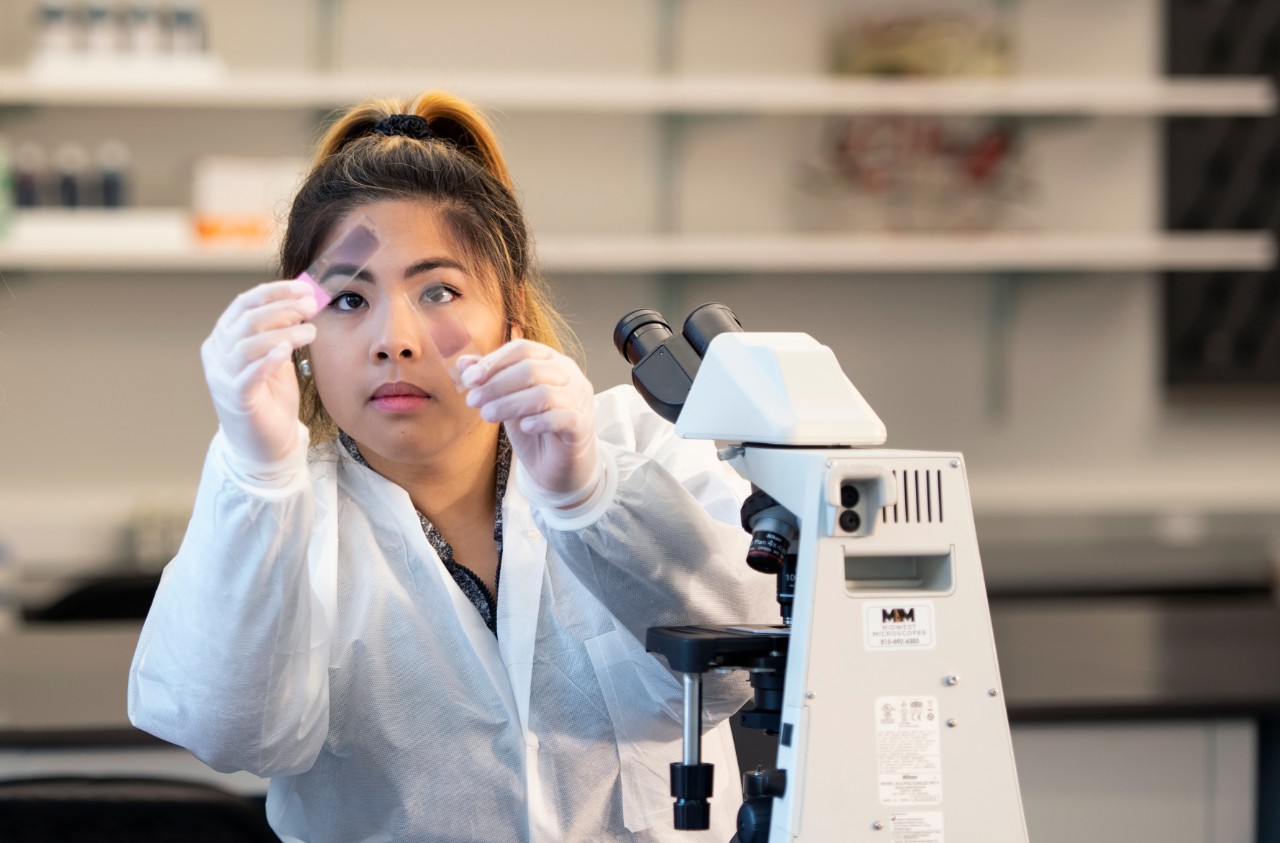
College of Allied Health Sciences launches unique master’s opportunity in laboratory leadership
The new Master of Medical Laboratory Science Leadership pathway is the only program of its kind
When Medical Laboratory Science (MLS) Program Director Pat Tille joined the faculty at the University of Cincinnati (UC) College of Allied Health Sciences (CAHS), she was charged with launching a new master’s program in medical laboratory science. It’s not an easy task, Tille says, since graduate opportunities for medical laboratory scientists are not all that common. In fact, “when we started putting this program together, there were only nine master’s programs in the entire country in medical laboratory science,” she says. After years of planning, this January will mark the launch of the college’s Master of Medical Laboratory Science Leadership program, which will be the only program of its kind in the country.
There isn’t a master’s program out there that looks like this one.
Pat Tille, Program Director of Master's of Medical Laboratory Science Program
The program, Tille says, is designed for practicing medical laboratory professionals who are already certified, as well as professionals in research laboratories, industry or other laboratory careers, who hold a bachelor’s degree in medical laboratory science or a related discipline. As long as applicants are working in a qualified laboratory or have related professional experience, they don’t need to have a bachelor’s degree in medical laboratory science—they only need a desire to take their education and career to the next level.
“Students who come out of medical laboratory science undergraduate programs are very heavily trained in technical skills, so they’re very science-oriented and not necessarily trained in management skills,” Tille says. “The whole idea of the new master’s program is that it’s geared toward medical laboratory science, but it’s also geared toward laboratory leadership because it incorporates leadership development skills, too.”
Students enrolled in the new program will have the option to specialize in one of four tracks: healthcare management, higher education or medical laboratory science advanced practice in either molecular diagnostics/immunology or cell therapy and transfusion medicine. Tille and her team strategically chose these concentrations because all four areas require advanced training. Plus, the workforce lacks master’s-prepared educators, supervisors and laboratory directors as well as the advanced technical knowledge needed in high complexity areas. There’s also a significant difference in salary for medical laboratory scientists who hold a master’s degree versus a bachelor’s in some areas of the country.
The five-semester online program features 18 credit hours of core classes, plus three elective courses in each concentration and a final capstone project. Students won’t be required to commit to a specific track until after completing their first year in the program. Where they will learn about specific competencies unique to each concentration, including medical laboratory science administration, educational strategies and accreditation and advancements in high complexity medical laboratory science. This allows students to “make an informed choice as to which track they want to go into, and that doesn’t happen when you get a master’s of business administration or health administration,” which are two degrees that medical laboratory scientists typically pursue, Tille says.
The biggest benefit, Tille argues, is the diversity in learning the program’s structure supports. Because it doesn’t require applicants to have a bachelor’s degree in medical laboratory science, it’s attractive to anyone who works in a medical, clinical or specialty laboratory.
“The students bring their experiences with them. You get a young lab scientist who has only been in the field for five years and someone who has been in the field for 30 years and they start having conversations; you’re going to see generational learning,” she says. “Diversity only enriches the group’s learning. I’m excited for January and look forward to working with the first cohort of students in the Master of Medical Laboratory Science Leadership.”
Featured image: Student working in Medical Laboratory Science laboratory. Photo/Colleen Kelley, UC Creative + Brand
The University of Cincinnati is the region's destination for thinking, making, doing, discovery and delivery. Next Lives Here.
Learn more about the Medical Laboratory Science Leadership program at the College of Allied Health Sciences.
Related Stories
ADAAPT: Growing Student Ideas
December 19, 2024
Steven Doehler, an industrial design professor at the University of Cincinnati’s College of Design, Architecture, Art, and Planning (DAAP), says he prioritizes the entrepreneurial aspect of a student's design product – which led him to create HomeGrown Studio.
What happens when you give co-op students 90 minutes to make a...
December 19, 2024
UC DAAP students on co-op at the Rockwell Group, an architecture firm in Manhattan, are featured in a Wall Street Journal article about the firm's gingerbread house competition. Check out their gingerbread replica of UC's Crosley Tower.
UC study examines delivery timing in mothers with chronic...
December 19, 2024
In a study recently published in the journal O&G Open, University of Cincinnati College of Medicine physician researchers found 39 weeks of gestation is optimal for delivery in mothers with chronic hypertension.